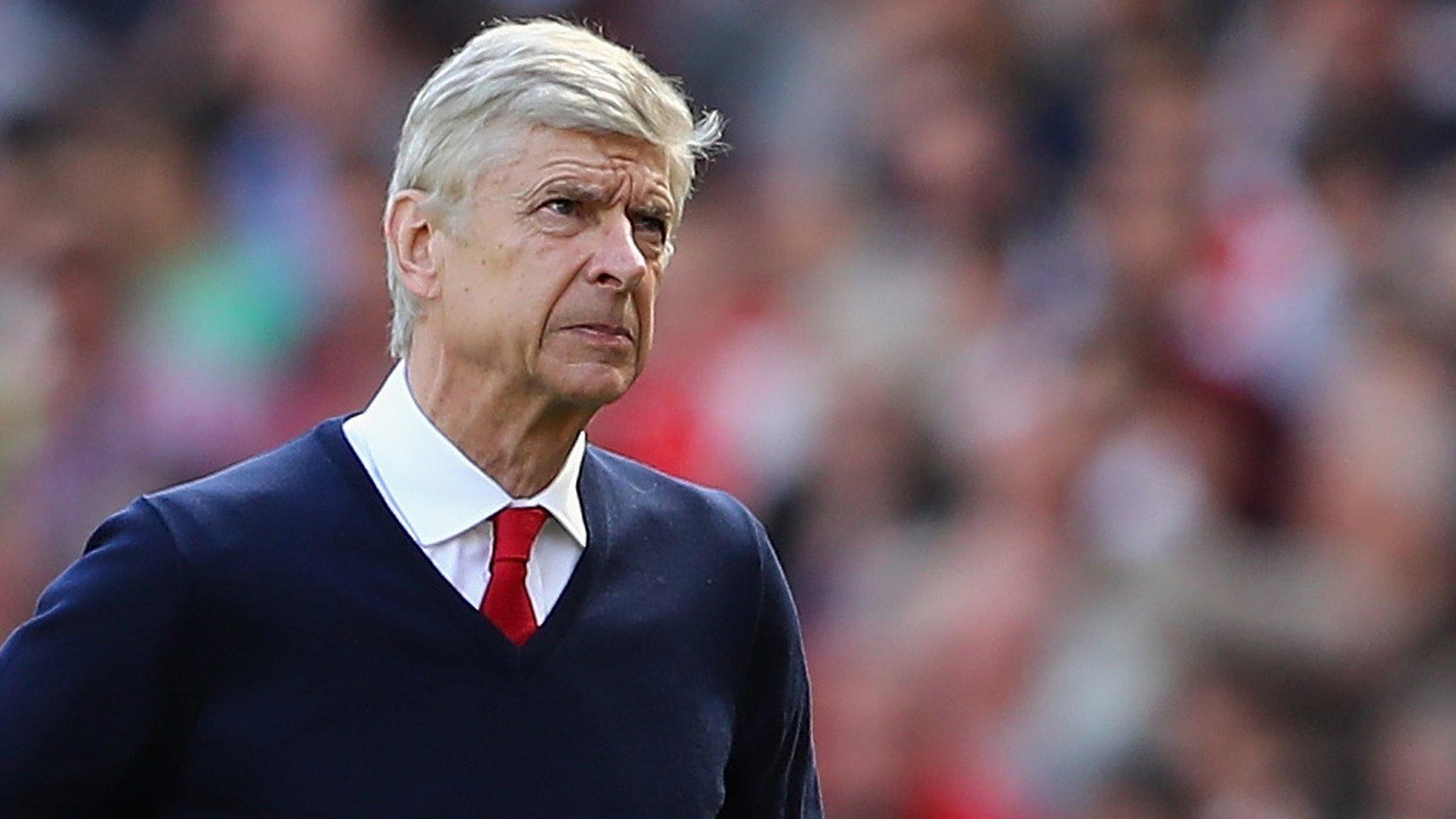'Wenger in' - can Arsene write a new chapter into Arsenal's history?
- Published
- comments
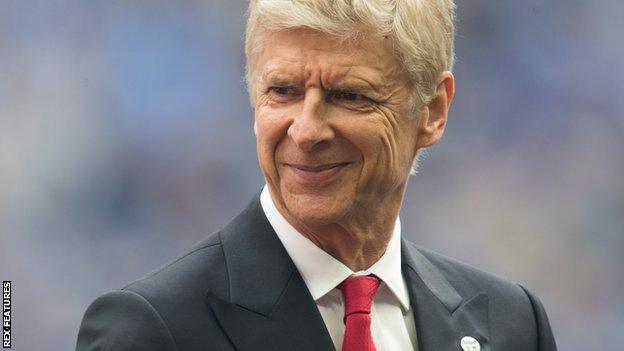
Wenger has won seven FA Cups - more than any other manager
The Arsene Wenger era - a story that started at Ewood Park against Blackburn Rovers on 12 October 1996 - will extend further into its third decade after he agreed a two-year deal to stay as Arsenal manager.
Wenger has become an increasingly divisive figure among Arsenal fans in recent years but has agreed to remain at the club in the after-glow of an historic seventh FA Cup win at the club after Saturday's 2-1 win against Chelsea at Wembley.
It was a success that added to his three Premier League titles, including two domestic doubles, and six Charity and Community Shields, ensuring he could play a strong hand in Monday's meeting with Arsenal owner Stan Kroenke that finally ended a tortuous, acrimonious period of uncertainty over his future.
A section of Arsenal's support have organised protest marches and made their discontent clear as Wenger's side once again failed to halt a barren title sequence stretching back to "The Invincibles" season of 2003/04 - with the manager describing some of his treatment as "a disgrace."
So will the wounds heal in the next phase of the Wenger era? And is this the right decision for Wenger and Arsenal?
Have Arsenal and Wenger got it right?
Wenger says he will "never forget" some of the criticism he has endured this season, clearly believing he should have been afforded more respect given his track record.
He delivered a very clear message to his detractors, and indeed Arsenal's board, when he said after the FA Cup Final win: "It is not about popularity. It is about competence."
Wenger's competence has been questioned by some this season but Saturday's win, when Premier League champions Chelsea were overpowered and outplayed, clawed back credibility and provided a platform of success for next season.
Lack of respect towards me a disgrace - Wenger
Arsenal have not qualified for the Champions League for the first time in 20 years - and many would believe an FA Cup triumph would be the perfect parting point, allowing Wenger to go out on a high and a successor to usher in the new era.
Wenger does not think in those terms. He is the eternal optimist who has never felt Arsenal were far away from recreating a title-winning team, even though the evidence against has piled up before him.
He is committed as ever, even after 1,175 games as Arsenal manager, 676 wins and a remarkable win percentage of 57.5% - but did Saturday start a new era of success that can emulate his early glories, or will he simply face the same criticism again at the first sign of trouble next season?
The Daily Mirror's chief football writer John Cross, author of "Arsene Wenger: The Inside Story Of Arsenal Under Arsene Wenger", first covered the club for Islington Gazette and has covered his reign through 20 years as a national reporter.
He told BBC Sport: "I think it has gone a bit stale at times. I'd love to see Arsene Wenger go out on a high and, maybe now on the back of FA Cup glory and history, the time has come for him to go.
"The fans enjoyed their day at Wembley but is that the mood long term, or will they quickly go back to being unhappy? It's a fine line and Wenger should be remembered as nothing but a hero. Staying longer would put that in jeopardy."
Cross adds: "He has been Arsenal's best ever manager. He's been fantastic, absolutely magnificent and an innovator for English football and Arsenal. But all good things come to an end and I just think, despite the FA Cup win, he's not the force he once was."
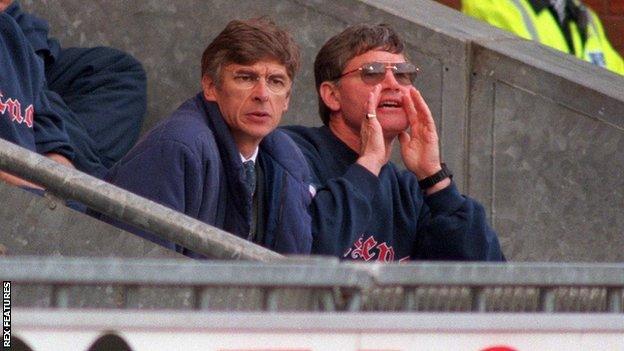
Arsene Wenger's first Arsenal game ended with a 2-0 win, both goals scored by Ian Wright
Arsenal season ticket holder and shareholder Darren Epstein, one of the most respected fan voices on Twitter with a following of 117,000, also believes there was a case for change.
He says: "In my opinion we have reached a natural time when he should depart and the club should look to new ideas - but given that we have won a trophy, in that sense it has been a successful season to some extent."
Wenger's stubbornness has been his strength so often, but the French revolutionary who changed the face of British football when he arrived in 1996, has seemed reluctant to change himself faced with the new breed of managers arriving in the Premier League, such as Antonio Conte at Chelsea, Jurgen Klopp at Liverpool, Pep Guardiola at Manchester City, old adversary Jose Mourinho at Manchester United and Tottenham's Mauricio Pochettino.
He may, though, offer the counter argument that for all the praise and respect lavished on Klopp, Guardiola and Pochettino this season, Wenger has actually won more than any of them.
In his mind trophies are still a currency worth dealing in and will refresh his ambitions for the summer now he is staying.
And while he picked up 69% of his trophy haul, 11 out of 16, from 1996/97 to 2005/06, his win percentage in that period has rarely dropped, reducing from 57.6% in that first phase to 57.5% in the subsequent period.
Ironically, Wenger and Arsenal's win percentage in all competitions this season, 63.6% from 55 matches, is actually higher than the 62.7% from 59 matches in "The Invincibles" campaign - an example of the vagaries of statistics.
Indeed, this season he won an impressive 23 league games compared to 26 in 2003/04. The sign of the soft underbelly Wenger has failed to cure in recent years, and has made him the target for such criticism, is illustrated by nine defeats this season.
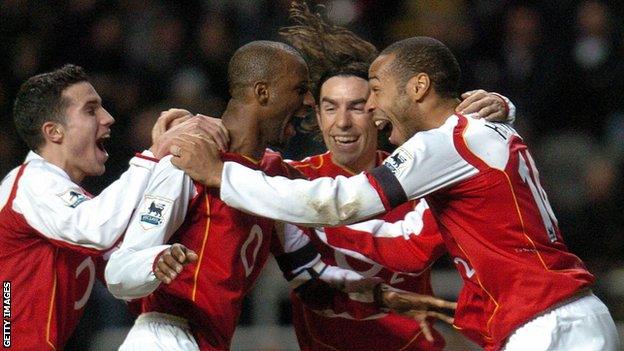
In 2004, Arsenal became the first side to go through a league season unbeaten since Preston achieved the feat in 1888-89
Wenger will now overtake Sir Alex Ferguson's record total of 810 games in charge, with his current total standing at 790.
And it is a tribute to his longevity that his record of 20 years and seven months at Arsenal puts him 16 years ahead of the next Premier League manager's record at his current club, Eddie Howe's four years and seven months at Bournemouth.
Wenger is experienced enough to know that the undercurrent of unhappiness that has swirled around Emirates Stadium will not disappear with news he is staying. He will be aware many fans will not rejoice and a slow start next season could see the ill-feeling return.
But Martin Keown, a cornerstone of Wenger's glittering early period, when he won three titles and three FA Cups under the Frenchman, believes he will relish the fight.
He told BBC Sport: "This guy is a fighter. He told me he was fighting every day in the playground at school. I hadn't met anyone else like that and I know I was. He is a scrapper and a survivor - more of a fighter and scrapper than people will ever think,"
There is an element of further risk to his reputation by staying on. It remains to be seen whether it was risk worth taking.
Wenger proud of 'outstanding' Arsenal
What must Wenger and Arsenal change?
Arsene Wenger insists Arsenal do not need major work on their squad, saying: "We have to keep 90% of the squad together and bring in one or two more to strengthen the group - not too many but top quality."
The win against Chelsea and a run of seven wins out of Arsenal's last eight Premier League games suggests he is right - but the wider context of failure to reach the Champions League for the first time in two decades and a seventh successive exit at the last 16 stage of that tournament are the more significant statistics.
Wenger's argument cut no ice with former England striker Alan Shearer, who told BBC Sport after the FA Cup Final win: "He said this week that he feels, with one or two signings, this Arsenal team is good enough to win the league - it's not.
"This Arsenal team is good enough to beat anyone on its day, as we saw at Wembley, but it's not good enough to win the league over a 38-game campaign.
"We saw that this season and they will have to strengthen considerably if they are going to change to become title contenders."
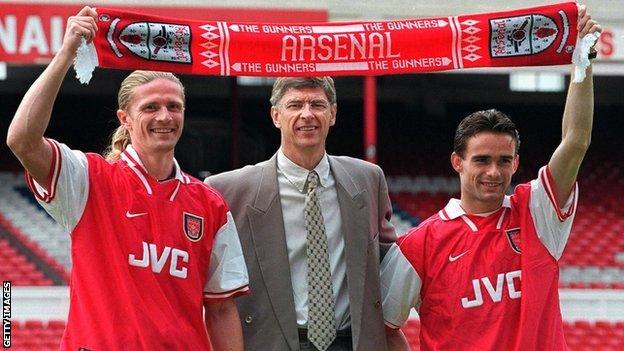
Transfer bargains Marc Overmars and Emmanuel Petit were both signed by Wenger in the summer of 1997
Wenger claimed Arsenal's season fell victim to a "blip" in March. It did contain desperate performances in 3-1 losses at Liverpool and West Bromwich Albion but a pattern of failure to challenge for the title for 13 years cannot simply be attributed to a "blip."
How to cure this ailment must now be Wenger's top priority.
He must inject stronger physical and mental resolve into his side, a failing exemplified by the embarrassing 10-2 aggregate loss to Bayern Munich in the Champions League last 16 and the lame 3-0 loss at Crystal Palace in April.
Wenger must also rediscover his great alchemist's touch of the early days at Arsenal when he took the best of George Graham's legacy - and indeed Bruce Rioch's given that he bought Dennis Bergkamp - and sprinkled gold dust on The Gunners.
He brought in Patrick Vieira, Emmanuel Petit, Thierry Henry, Marc Overmars, Robert Pires and the teenage Nicolas Anelka - bought from Paris St. Germain for £500,000 in February 1997 as a 17-year-old and sold to Real Madrid in the summer of 1999 for £22.3m - and Robin van Persie.
It displayed the touch of a master in the transfer market. As Keown says: "He bought great players and made them greater."
Wenger's brilliance has appeared to desert him in recent times, with the list of stellar departures over the last decade such as Ashley Cole, Thierry Henry, Cesc Fabregas, Samir Nasir, Kolo Toure, Emmanuel Adebayor and Van Persie - who left Arsenal to win the title at Manchester United - not offset by a similar quality of arrivals.
Wenger was handicapped financially as Emirates Stadium was built but this is a trend which he and Arsenal's hierarchy, who have been able to use Wenger as a convenient shield from criticism, must change.
He has still brought in players of world repute such as Mesut Ozil from Real Madrid and Alexis Sanchez from Barcelona, but he must unearth the old habit of marrying that quality to uncovering the hidden gems that were once his trademark.
Keown says: "I think he's got good staff around him. I think the issue is the judgement of players, that's where now maybe there is a flaw coming in. He's judging these players as good enough and they haven't been.
"That can only stop with the manager and therefore he needs to get the right ingredients back into the club."
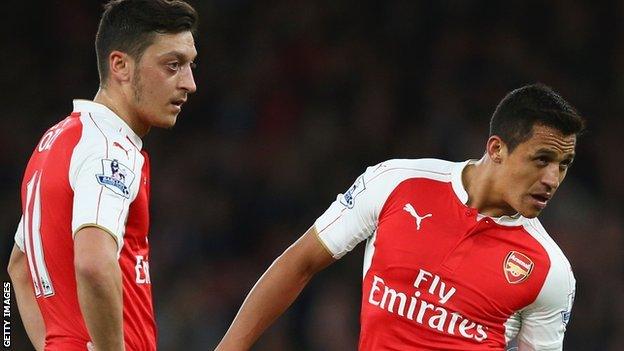
Contract negotiations with star players Ozil and Sanchez have been another subplot of Arsenal's season
John Cross says: "They must buy better. He must change and evolve in terms of scouting and maybe the backroom staff needs a shake-up. I do think a bit of change can freshen things up even if the manager remains the same."
Keown believes structural change is important, along with that improved transfer strategy, although Wenger has made his distaste and disdain for the appointment of a director of football obvious.
"We need to see a really ruthless summer now," says shareholder and fan Darren Epstein, "with departures being replaced by far better arrivals.
"He needs to be ruthless. He is way too loyal and that has been to the huge detriment of the football club in my opinion.
"Big clubs don't wait that length of time to see if a player will end up being good enough."
Former Arsenal keeper Jens Lehmann, a member of "The Invincibles", believes Wenger can make the necessary changes, telling BBC Sport: "Of course there is criticism but on the other hand everybody who knows Arsene is aware he has got the intelligence and creativity to turn it right again.
"He has to make changes but if he can do that he can go on for another one or two years."
Wenger must solve contract issues for Ozil and Sanchez, who both have a year left on current deals, swiftly to stop the scenery shifting to another debate backstage.
He has a good chance of keeping the German because of a lack of serious alternatives but Bayern Munich are among a clutch of clubs linked with the Chilean.
Sanchez may be high maintenance and prone to public petulance, but he has almost become priceless to Arsenal.
The unrest off the field has been mirrored by discontent aimed at the boardroom, with supporters chanting for owner Kroenke to leave the club during and after the final game of the season against Everton, days after it was revealed he had rejected a £1.3bn takeover bid from Alisher Usmanov, who has a 30% stake in the club.
Kroenke has always been a staunch Wenger supporter but is seen by many fans as too much of a benign, distant presence.
Epstein adds: "The club position is harder to tell - a non-intervening owner in Stan Kroenke, a chief executive officer in Ivan Gazidis who seems to want to implement change but Arsene is against it, a schism within the fanbase. It's hard to see how that is repaired unless we become truly competitive."
Keown also hints that Arsenal must now adopt a tougher mindset and aim higher to end the years of being marginalised in the chase for the elusive Premier League prize.
He told the BBC: "The mediocrity that has been created by accepting fourth place is good enough has created a problem for this current group.
"When the manager and the club come out and say they are happy with fourth, well I don't know what happened there because they certainly weren't happy with that when I was there."
And this is the pattern Wenger, having re-committed to Arsenal, must quickly change.
How will Arsenal's fans react?
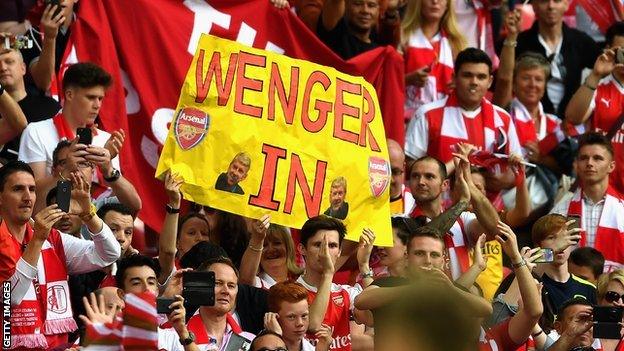
Wenger has enjoyed both loyal support and fierce criticism from sections of the Arsenal fanbase this season
Wenger's stock is currently high - even those who have marched against him and brandished banners such as "Thanks For The Memories But It's Time To Say Goodbye", "Wexit" and "Every Good Story Has An Ending" must give him huge praise for the Wembley victory.
The question is how long it will be before the reservoir of goodwill starts to run dry once more should Wenger and his team fail to challenge for title next season.
John Cross says decision on Wenger will not be a cause for unanimous celebration.
"I don't think the fans will be impressed", says Cross
"I think it's time for change. It's been more pessimistic than optimistic for large parts of the season. But no-one should forget the glory and celebrations from the FA Cup final. That should be the abiding memory of the season and of Wenger."
If Wenger is rejuvenated by Saturday's success and his third FA Cup win in four years - a highly impressive record - there is now the chance of a summer to rebuild optimism.
"My, and many other fans', optimism stems from what the club usually does in the summer" adds Epstein. "The summer we bought Petr Cech from Chelsea and nobody else has led us to where we are this season in my opinion and did huge harm to the team's ability to compete.
"I would hope they know this summer they need to add quality in two or three players."
And with the debate around his future finally resolved, Arsene Wenger can start to write fresh chapters in his Arsenal story.
- Published30 May 2017
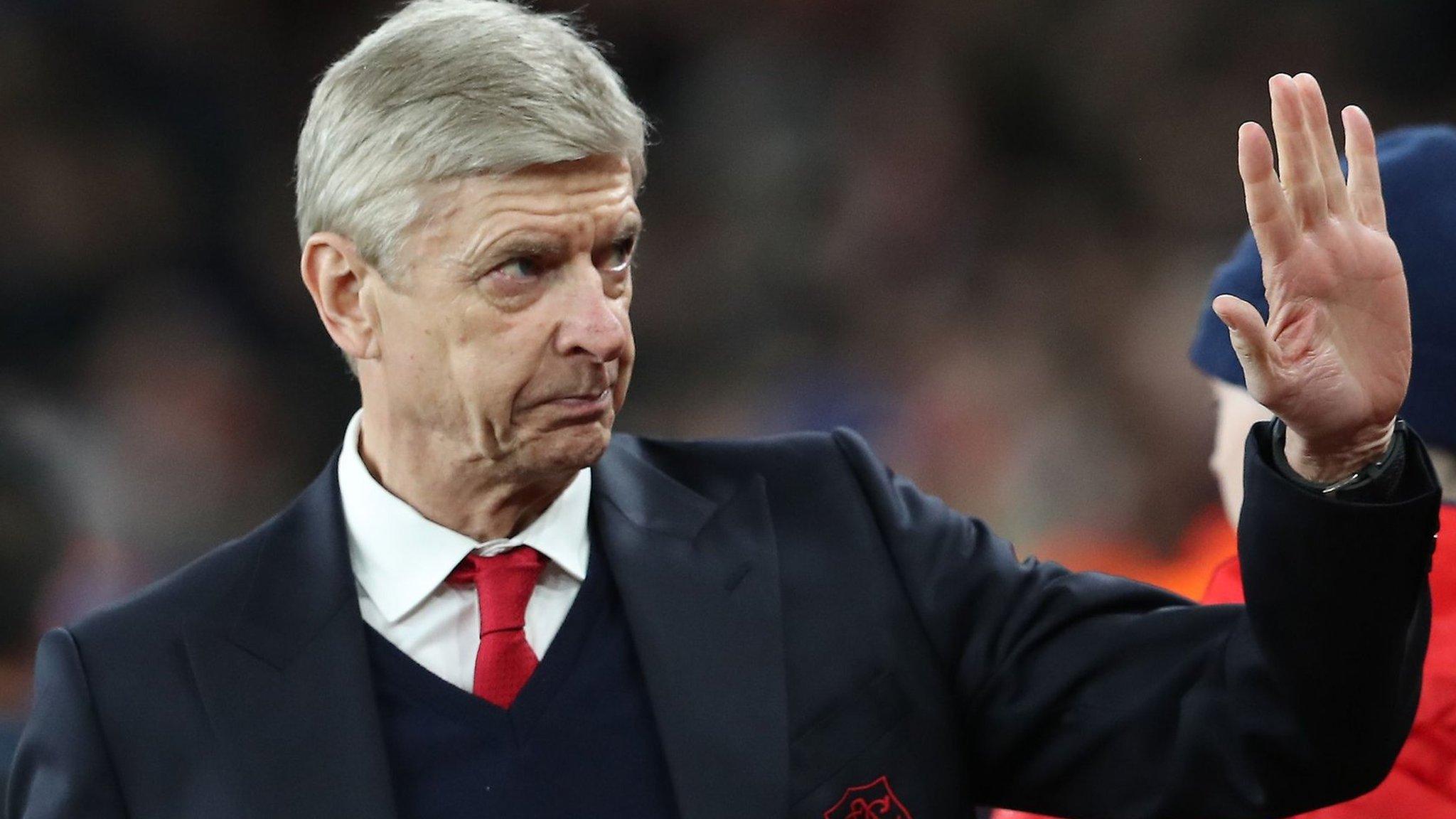
- Published28 May 2017
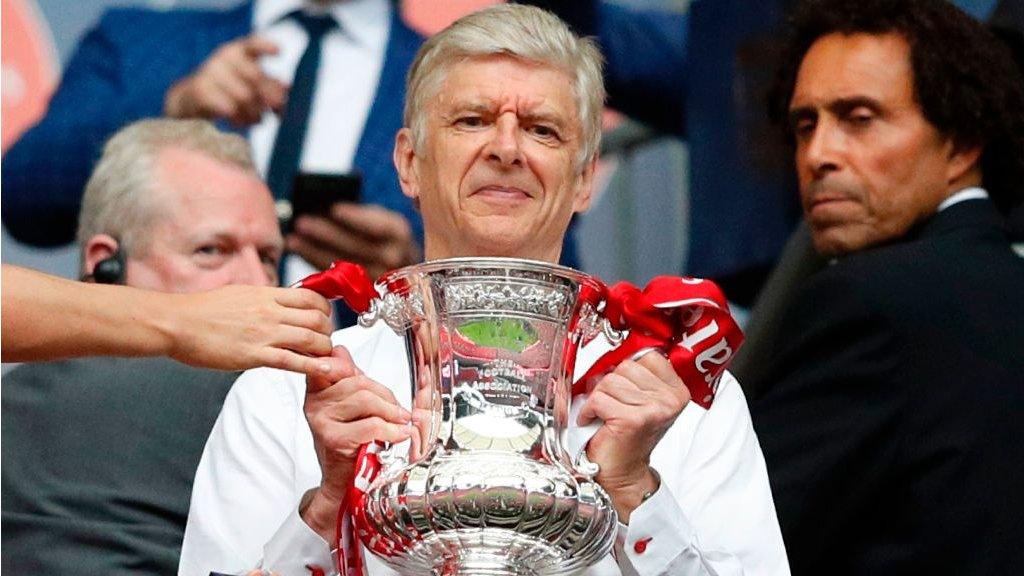
- Published27 May 2017
